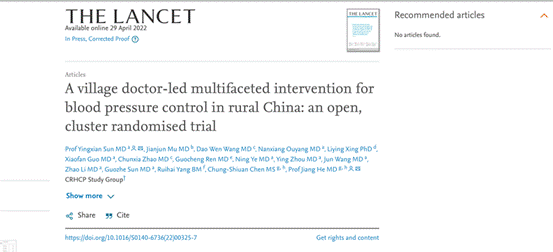Recently, a large-scale cluster randomized controlled study of "China Rural Hypertension Control Project (CRHCP)" jointly completed by Professor Sun Yingxian from the First Hospital of China Medical University and Professor Mu Jianjun from Department of Cardiology of the First Affiliated Hospital of Xi’an Jiaotong University (XJTU) has created a major breakthrough. On April 30, the primary outcome of the first stage CRHCP entitled "A village doctor-led multifaceted intervention for blood pressure control in rural China: an open, cluster randomised trial" was published online in The Lancet. Professor Mu Jianjun was the second author, and our hospital was the second affiliation of this article.

CRHCP is a main part of National Key Research and Development Project during the 13th Five-Year Plan. Professor Mu Jianjun's team was responsible for one of the key sub-topics. In this study, 33,995 hypertension patients from 326 villages were randomly assigned to village doctor-led multifaceted intervention and enhanced usual care groups. For the first stage, patients were followed up for 18 months. The mean blood pressure in the intervention group decreased from 157.0/87.9mmHg at baseline to 130.5/73.2 mmHg at 18 months, and decreased from 155.4/87.2 mmHg to 143.5/79.5 mmHg in the control group. In the intervention group, 57.0% of patients reached the blood pressure target of <130/80 mmHg, and 19.9% in the control group, with significant differences between two groups. The blood pressure reduction in the intervention group was significantly better than that in the control group. This study proved, for the first time, the safety and effectiveness of a village doctor-led multifaceted intervention. Currently, CRHCP is the largest community-based multifaceted intervention study for hypertension and the largest intensified antihypertensive study worldwide. For the second stage, data collection is still ongoing, and the primary outcomes assessed will be cardiovascular disease event and all-cause mortality over 36 months. It is the first intensified antihypertensive study in community population worldwide, in which cardiovascular and cerebrovascular events and death are regarded as the end points, which will provide more reliable evidence for the decision-making of hypertension prevention and treatment in China and around the world.
The Lancet also published a Comment on the team's work. Professor Tazeen H Jafar from Duke Global Health Institute of Duke University in the United States highly recognized the achievement by commenting that "these important findings should be able to convince policy makers to promote this antihypertensive model in rural communities. These efforts made by the team will undoubtedly accelerate the realization of the national goal of preventing and treating non-communicable diseases, thereby realizing the sustainable development plan of reducing the mortality rate of cardiovascular diseases by 30% in 2030".
Article link:https://authors.elsevier.com/c/1e-2YV-4XHCuv